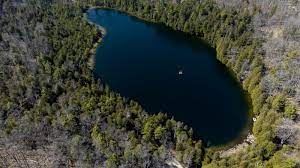Beginning Of Anthropocene epoch : Evidence

Geologists recently said sediments at Crawford Lake in Canada’s Ontario have provided evidence of the beginning of the Anthropocene epoch.
- Anthropocene epoch is a proposed epoch that denotes the present geological time interval, in which the Earth’s ecosystem has gone through radical changes due to human impact.
- The word Anthropocene is derived from the Greek words anthropo, for “man,” and cene for “new,” coined and made popular by biologist Eugene Stormer and chemist Paul Crutzen in 2000.
- There are numerous phenomena associated with this proposed epoch, such as global warming, sea-level rise, ocean acidification, mass-scale soil erosion, the advent of deadly heat waves, deterioration of the biosphere and other detrimental changes in the environment.
Geological Time Scale:
- Earth’s history is divided into a hierarchical series of smaller chunks of time, referred to as the geologic time scale.
- These divisions, in descending length of time, are called eons, eras, periods, epochs, and ages.
- These units are classified based on Earth’s rock layers, or strata, and the fossils found within them.
- From examining these fossils, scientists know that certain organisms are characteristic of certain parts of the geologic record.
- The study of this correlation is called stratigraphy.
- Current Epoch: Officially, the current epoch is called the Holocene, which began 11,700 years ago after the last major ice age.




